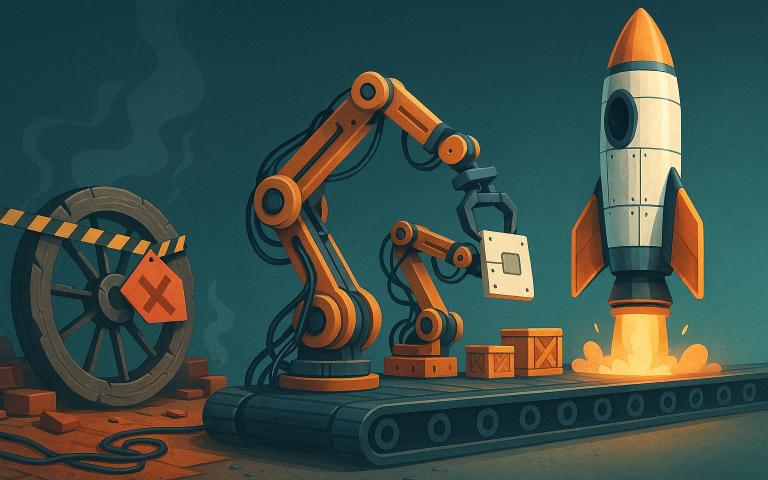Stop Reinventing the Wheel: Why Frameworks and CMS Beat Pure Custom Code
There is a persistent belief in the tech world that writing everything from scratch is the mark of true craftsmanship. Businesses hear “custom code” and imagine something unique, perfectly tailored, and future-proof.

But in reality, starting from zero rarely makes sense. It often drains budgets, delays launches, and leaves companies stuck with systems that only the original developer fully understands. Frameworks and CMS were created to solve exactly this problem—and today, they are the smarter, safer, and more scalable choice.
Why Pure Custom Code Fails in Practice
Imagine you hire a developer who insists on building your website or application entirely from scratch. No frameworks, no CMS—just “pure code.” At first, it might sound appealing: no unnecessary overhead, no plugins you don’t need, complete control.
But fast-forward a year. The developer is gone, and your new team is staring at an unfamiliar codebase with no documentation, no community support, and no clear structure. Every small change takes days, every new feature feels like pulling bricks out of a Jenga tower. What started as a promise of freedom becomes a trap.
That’s the reality of pure custom code. It often means:
- Solving problems that have already been solved thousands of times before.
- Spending months building what frameworks or CMS offer out-of-the-box.
- Slower time-to-market, while competitors launch quickly using proven tools.
- A fragile system that depends too heavily on a single developer’s personal style.
The Real Value of Frameworks
Frameworks like Laravel, Symfony, or Django aren’t shortcuts—they are the foundation of modern web development. They give projects a clear structure, enforce best practices, and reduce repetitive work.
When you use a framework, you don’t start from zero. Instead, you stand on the shoulders of thousands of developers who have already solved authentication, database handling, API integrations, and more. That means less time fixing basic issues, and more time focusing on what makes your product unique.
Most importantly, frameworks standardize development. If one developer leaves, another can take over because they already know the conventions. Hiring becomes easier, updates are predictable, and your project isn’t tied to one person’s “custom” style.
Why CMS Still Matters
For many projects, especially websites, a CMS like WordPress, Drupal, or Joomla is still the best choice. Businesses don’t want to wait months just to publish articles, update product pages, or add simple features. They want something reliable, familiar, and quick.
A CMS gives exactly that:
- Speed – You can have a website live in days, not months.
- Flexibility – Plugins and themes cover everything from SEO optimization to e-commerce.
- Accessibility – Non-technical team members can manage content without calling a developer.
- Support – With millions of users, you’ll always find help, tutorials, and professionals ready to step in.
Yes, CMS platforms have limits, especially when you try to push them far beyond their intended use. But within their sweet spot—content-driven websites—they remain unmatched.
When Pure Custom Code Still Makes Sense
To be fair, there are situations where writing code from scratch is justified. Ultra-specialized systems, high-frequency trading platforms, or experimental R&D projects may require a level of customization frameworks or CMS cannot provide. But these cases are rare. For 95% of businesses, choosing frameworks or CMS isn’t just convenient—it’s the responsible choice.
Conclusion
The myth of pure custom code is attractive, but it rarely serves business goals. Frameworks and CMS exist because they solve real problems: they reduce costs, speed up delivery, and make systems maintainable in the long run. Instead of building a house brick by brick, you’re starting with strong foundations, ready-made walls, and a roof that has already been tested in every kind of weather.
So next time you hear the phrase “let’s build it all from scratch,” ask yourself: do you want to be unique for the sake of it, or do you want to deliver real value faster, safer, and smarter?
Get in touch
Have a
project
in mind?
Tell us the context and the outcome you want. We’ll reply within 1 business day with the simplest next step (timeline, rough budget, or quick audit).